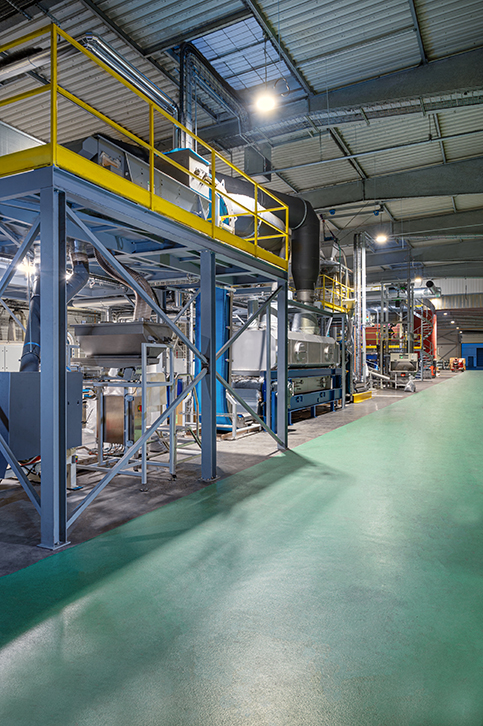The environmental challenges associated with carbon fibre
Carbon fibre, renowned for its exceptional strength-to-weight ratio, has found a variety of applications, including in the automotive, aerospace, sports equipment, and renewable energy sectors. However, its production and disposal pose significant environmental challenges. Traditional carbon-fibre manufacturing processes are energy-intensive and generate a considerable amount of waste. Additionally, the disposal of carbon-fibre composites often leads to landfilling or incineration, releasing greenhouse gases into the atmosphere. As industries strive to align with sustainability goals, growing demand for sustainable carbon-fibre products has led to a critical need for more efficient and environmentally friendly ways of producing and recycling carbon-fibre materials.
The response provided by Apply Carbon
Recognising this need, Apply Carbon has taken a pioneering step by establishing a new 16,500 m² factory dedicated to carbon-fibre recycling, and by acquiring an additional 100,000 m² of land for future expansion. With its cutting-edge recycling technology, the factory currently produces close to 2000 metric tonnes of recycled carbon fibre per year, with a nameplate capacity nearing 4000 metric tonnes per year. It currently holds a stock of approximately 3000 metric tonnes of raw materials, to ensure high product quality, uniformity, and security of supply.
Adjacent to this new facility for recycled carbon fibres, Apply Carbon has also set up a dedicated production area for recycled para-aramid fibres, with an annual production capacity exceeding 700 metric tonnes. This additional capacity for milled and granulated aramid products will help meet rapidly increasing demand, whether for abrasion-resistant polymer compounds used in friction and wear applications or for aramid pulp used in low-wear and dust-free brake pads – areas that Apply Carbon has been serving successfully for several years.
Towards a new industry benchmark
The company’s investment has also been geared towards achieving new standards in terms of both manufacturing and energy efficiency. “Virtually all production processes – from the milling of raw materials to the granulation, sizing, cutting and packaging of finished products – have been automated to ensure cost-effectiveness and batch-to-batch reproducibility” says Hervé Cayuela, CEO of Apply Carbon. Latest-generation heat pumps are used to power the advanced drying ovens; a SCADA system has been implemented to minimise energy use across the entire facility; and the installation of 1 MW of solar power capacity will ensure that more than half of the factory’s energy demand will be covered by renewable energy. This has allowed Apply Carbon to establish a benchmark for the eco-conscious production of high-performance products.
“With this investment, we have achieved a milestone in the mass-conversion of carbon-fibre waste into affordable, high-quality reusable products” affirms Bruno Douchy, Commercial Director at Apply Carbon. “Our differentiated portfolio of lightweight, mechanically robust, and electrically conductive materials is paving the way for a wide range of key future applications. With this fully automated production plant, Apply Carbon is reinforcing its market leadership in this area and ensuring that the supply-side capacity remains aligned with growing demand. We are proud that, by preserving valuable resources and reducing greenhouse gas emissions, our state-of-the-art facility can make a significant positive contribution to the emergence of a more sustainable circular economy”.
Promising growth potential with upcoming capacity increases
In a context where the number of carbon-fibre applications has been steadily increasing over the years, demand for recycled carbon fibres in particular has exceeded overall market growth. Driven by the attractive price points of its products, their appealing sets of performance attributes, and the fact that their global-warming potential is 85% lower than that of their virgin counterparts, Apply Carbon has seen its revenues from recycled carbon fibres double over the past five years, with consistent double-digit year-over-year growth. This growth is not expected to diminish in the foreseeable future, as new applications in electronics (antistatic packaging), the automotive sector (electromagnetic interference shielding), 3D printing, industry (metal replacement) and hydrogen (fuel cells) in particular will further catalyse demand – not to mention applications in rubber and gaskets. Moreover, to support this future growth, Apply Carbon will continue to implement its investment roadmap, with additional pyrolysis capacity expected by 2025, to also enable the recycling of post-consumer ‘end-of-life’ carbon feedstock, in addition to the current post-industrial carbon waste.
The grand opening of Apply Carbon’s new carbon-fibre recycling facility in Plouay, France will occur in January 2024, in the presence of the company’s partners, official local authorities, and the press.

 English
English